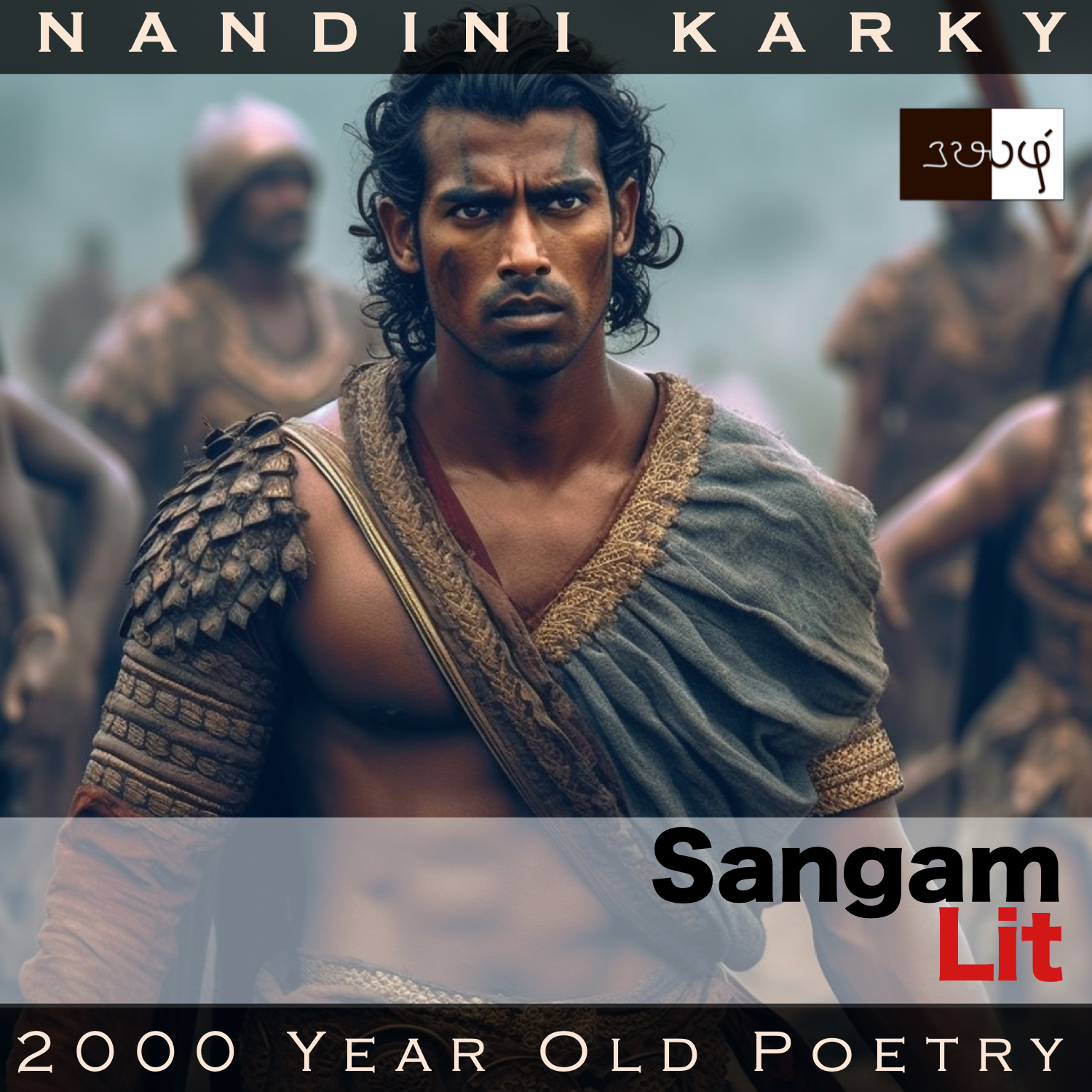Podcast: Play in new window | Download
Subscribe: Apple Podcasts | Spotify | Amazon Music | Android | iHeartRadio | TuneIn | RSS | More
In this episode, we perceive a unique style of praise, as portrayed in Sangam Literary work, Puranaanooru 167, penned about the Velir King Enaathi Thirukkilli by the poet Konattu Erichaloor Maadalan Madurai Kumaranaar. The verse is situated in the category of ‘Vaagai Thinai’ or ‘Victory’ and sketches the personality of this king.

நீயே, அமர் காணின் அமர் கடந்து, அவர்
படை விலக்கி எதிர் நிற்றலின்,
வாஅள் வாய்த்த வடு ஆழ் யாக்கையொடு,
கேள்விக்கு இனியை; கட்கு இன்னாயே:
அவரே, நிற் காணின் புறம் கொடுத்தலின்,
ஊறு அறியா மெய் யாக்கையொடு,
கண்ணுக்கு இனியர்; செவிக்கு இன்னாரே:
அதனால், நீயும் ஒன்று இனியை; அவரும் ஒன்று இனியர்;
ஒவ்வா யா உள, மற்றே? வெல் போர்க்
கழல் புனை திருந்து அடிக் கடு மான் கிள்ளி!
நின்னை வியக்கும் இவ் உலகம்; அஃது
என்னோ? பெரும! உரைத்திசின் எமக்கே.
A structured song celebrating a king by insulting him! The poet’s words can be translated as follows:
“As for you, in the midst of a battle, before you triumph, you stand facing and deflecting the army of enemies, making your body covered with scars of swords plunging in. And so, you are pleasant to the ears but not to the eyes!
As for them, since they retreated the moment they saw you, their bodies have suffered no injury. And so, they are pleasant to the eyes, but not to the ears!
If you see, you have one thing that’s pleasant about you and they have one thing that’s pleasant about them. So, what could be the other differences, O conqueror of battles, Killi, with speeding horses and fine feet adorned with warrior anklets? For the world is amazed only by you… Why is that, O lord? Please explain it to me!”
Time to delve into the nuances. The poet starts by sketching the king’s attitude in battles that he inevitably wins over. Here, he bravely stands and faces the horde of enemies who come attacking him and as a result, his skin is covered with wounds and scars, tracing the trajectory of enemy swords that have pierced in him. ‘So, when I look at you, it’s not a pleasant sight but when I hear about you, that’s so agreeable indeed’, says this poet.
Next, he turns his focus to the king’s enemies, who seem to run away from the battlefield the moment they glimpse this king Killi, and so their bodies are safe and sound and have suffered no damage in the battles. As can be expected, they are pleasant to look at, but hearing of their shameful act is not at all agreeable to the ears, contrasts this poet.
Summing up these aspects, the poet says to the king, ‘Hey, you have one thing that’s good about you. They have one thing that’s good about them. So, how come the whole world looks only at you in awe? I don’t get it! Please tell me how’. With that seemingly confused question, the poet concludes his words to this victorious king, celebrated for his speedy horses and etched anklets.
In a nutshell, the poet is saying with seeming derision that the king is ugly while his enemies are handsome. At the same time, the good thing about the king is the sound of his fame, which falls on the poet’s ears, and that’s the same thing bad about the enemies. King – 1, Enemies – 1. And yet, why does the world seem to make it King – 100 and Enemies – 0, the poet asks with false confusion! I say ‘false confusion’ because the poet fully well knows this is not a case of balancing equations in arithmetic but an exposition of what matters in a king’s quality. The beauty of your form is of no consequence if the music of your fame is contradictory, conveys this poet with conviction!




Share your thoughts...